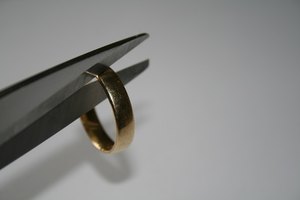How to Get a Copy of a Divorce Decree in Nevada
By Jayne Thompson
Updated November 15, 2017

ring image by Jens Klingebiel from Fotolia.com
The final divorce decree is the document that makes the divorce official. You'll need an authorized copy of your decree for legal matters, for example, to remarry or to make a claim for Social Security as a former spouse. In Nevada, divorce records are held by the county where the divorce was granted. You can easily obtain a certified copy from the clerk of the courthouse where you were divorced.
Tips
Obtaining a divorce decree in Nevada is as simple as visiting the court in the county where the divorce was authorized.
Find the Case Number
Look up a family court case online by visiting the website of the court for your county and navigating to the records inquiry page. Follow the instructions on screen. In Clark County, for example, click on "Family Records"; then search the public records by the party's name. Find your case from the list of matching records and make a note of the case number. If the case is sealed, you will not be able to view any information online.
Visit the Court Clerk's Office
Go to the clerk of the family court in the county in which you were divorced. Bring identification as well as the case number. If the record is sealed, the clerk will be able to look it up for you upon presentation of proper identification. Request the number of copies you need. Some counties have posted an Official Records Copy Order Form on the court's website. You can save time by downloading this form before you arrive at the court.
Pay the Fee
The Court makes a nominal charge for photocopies of around $0.50 per page. Your divorce decree can be certified as a true copy of the original for an additional $3.00 per document.
Mail Your Request
You can also obtain a copy of your divorce decree by writing to the clerk of the court in which you were divorced. Include the name of the parties, the date and place of the divorce, the case number, and the number of copies you are requesting. Enclose cash, a money order or certified check for the fee, and a self-addressed, stamped envelope. The clerk will use it mail your document or will hold copies for pickup at your request.
Ask Your Divorce Attorney
Another option for obtaining your divorce decree is to contact your divorce attorney. Nevada lawyers are obligated to keep case files for seven years, so if you divorce is relatively recent, he or she may be able to provide a certified copy of your divorce decree.
A Note About Public Searches
Nevada divorce records are public record, which means that anyone can get basic information regarding a divorce unless the papers have been sealed. If you're looking for someone else's divorce records, perhaps because you are researching a family tree, submit a request in writing to the clerk of the relevant court. The Clark County court clerk, for example, holds paper records dating back to 1909 and should be able to find what you are looking for. Include the full name of the person whose records you need, the city where the divorce occurred, and the approximate date of the divorce.
References
- Nevada Division of Public and Behavioral Health: Marriage and Divorce Records
- Family Law Self Help Center: Courts and Case Lookup
- Clark County: Records Enquiry
- Eighth Judicial District Court: Records Search
- Nye County Clerk of the District Court: FAQ
- American Bar Association: Materials on Client File Retention
Resources
Tips
- Be sure to provide all aliases and previous names in your request including: nicknames and alternate spellings of a name.
- Call the County Clerk office after a week to confirm that they received the request.
Writer Bio
A former corporate real estate lawyer, Jayne Thompson writes about law, business and personal finance, drawing on 17 years’ experience in the legal sector. She holds a Bachelor of Laws from the University of Birmingham and a Masters in International Law from the University of East London. Her work has appeared on numerous legal blogs including Quittance, Upcounsel and Medical Negligence Experts. Find her at www.whiterosecopywriting.com.